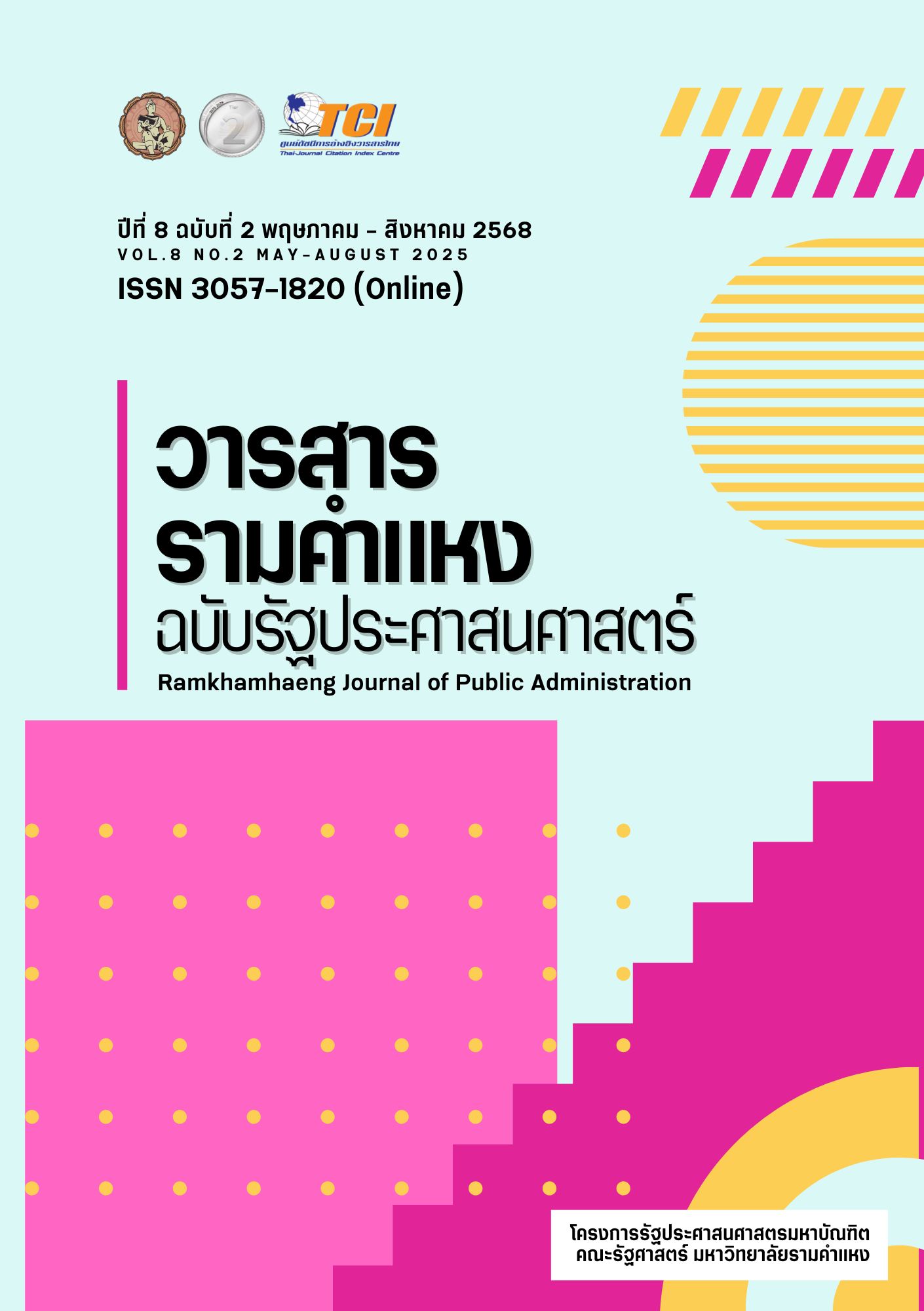The guidelines for developing the smart cities of local government organizations in Nakhon Sawan province
Keywords:
Development; Smart City; Local Government OrganizationAbstract
This research aimed to: 1) Study the level of smart city development and the factors influencing the development of smart cities. 2) Explore the problems and obstacles in smart city development. 3) Identify guidelines for smart city development by local administrative organizations in Nakhon Sawan Province. This study employed a mixed-methods approach, combining quantitative and qualitative research. The quantitative data was collected from a sample of 103 local administrative organizations using a questionnaire, and the data was analyzed using confirmatory factor analysis. For the qualitative part, five key informants were interviewed using semi-structured interviews, and the data was analyzed through inductive content analysis.
The results revealed that: The level of smart city development was moderate (X̅ = 2.51, S.D. = 0.83). The factors influencing the development of smart cities were at a high level (X̅ = 3.84, S.D. = 0.97). All five factors had factor loadings ranging from 0.67 to 0.88, with explained variances between 45% and 77%. All factors were statistically significant at the 0.01 level.
Problems and obstacles in the development of smart cities by local administrative organizations in Nakhon Sawan Province were identified as follows: 1) Citizen needs and demands misunderstandings, mismatched expectations, and a lack of preparedness for an aging society. 2) Infrastructure limitations in existing infrastructure, budget delays, regulatory obstacles, and disparities between urban and rural areas. 3) Data and technology management lack of personnel knowledge about smart cities, complex online systems, and negative attitudes toward technology. 4) Policy and governance regulatory constraints and a lack of continuity in implementation. 5) Collaborative networking – slow inter-agency coordination and lack of cooperation from community leaders and the public.
Guidelines for smart city development by local administrative organizations in Nakhon Sawan Province included: 1) Public demand promote public participation through training, public hearings, technology trials, feedback integration, elder-friendly infrastructure, and lifelong learning. 2) Infrastructure focus on public-private partnerships, online education development, and smart agriculture. 3) Data and technology management support staff training, mentorship programs, user testing, and the use of open-source software. 4) Policy and governance revise laws to accommodate digital technology, support localized regulations, and establish long-term smart city policies. 5) Collaborative networks create cooperation frameworks, organize multi-stakeholder meetings, develop urban issue-reporting platforms, support small-scale community projects, digital volunteer networks, and private sector participation.
References
จารุวรรณ ประวันเน. (2563). “กระบวนการเปลี่ยนแปลงสู่ความเป็นเมือง อัจฉริยะ : กรณีศึกษาเทศบาลนครขอนแก่น.” วารสารการบริหารท้องถิ่น มหาวิทยาลัยขอนแก่น. 13(3), 267-282.
นิภาพรรณ เจนสันติกุล. (2563). “เมืองอัจฉริยะ : ความหมายและข้อควรพิจารณาสำหรับการพัฒนาเมือง.” วารสารสังคมศาสตร์บูรณาการ มหาวิทยาลัยมหิดล. 7(1), 3-18.
พิมพ์ลดา ธีระมนต์ประณีต. (2566). “นวัตกรรมเพื่อการพัฒนาท้องถิ่นสู่เมืองอัจฉริยะเพื่อการยกระดับคุณภาพชีวิตประชาชนในเขตการบริการของเทศบาลในพื้นที่ภาคตะวันออกเฉียงเหนือตอนล่าง.” วารสารสหวิทยาการวิจัยและวิชาการ. 3(1), 163-180.
ภาฝัน จิตต์มิตรภาพ และคณะ. (2564). “ปัจจัยขับเคลื่อนความสำเร็จในการพัฒนาเมืองอัจฉริยะ จังหวัดภูเก็ต.” วารสารปัญญาภิวัฒน์. 14(1), 188-200.
ภาวิณี เอี่ยมตระกูล. (2562). กรอบแนวทางการพัฒนาเมืองอัจฉริยะ กรณีศึกษาจังหวัดปทุมธานี. กรุงเทพฯ: สำนักงานศูนย์วิจัยและให้คำปรึกษาแห่งมหาวิทยาลัยธรรมศาสตร์.
มุกุนด์ ชรีดาร์. (2561). Smart City ไทยอยู่จุดไหน แล้วอะไรคือปัจจัยความสำเร็จ. สืบค้นเมื่อ 14 ตุลาคม 2566 จาก https://techsauce.co/tech-and-biz/smart-city-thailand
ศิริวัฒน์ เจนรังสรรค์, และ วิมลสิริ แสงกรด. (2562). “การพัฒนาเทศบาลเมืองให้เป็นเมืองอัจฉริยะ ในพื้นที่จังหวัดขอนแก่น.” Journal of Buddhist Education and Research. 5(2), 361-374.
ศุภวัฒนากร วงศ์ธนวสุ, สุรเดช ทวีแสงสกุลไทย และสุริยานนท์ พลสิม. (2564). การพัฒนาเมืองอจัฉริยะขอนแก่น. พิมพ์ครั้งที่ 1. ขอนแก่น : โรงพิมพ์คลังนานาวิทยา.
สถาบันดำรงราชานุภาพ. (2563). โครงการศึกษาแนวทางการพัฒนาเมืองอัจฉริยะ (Smart City) กับบทบาทของกระทรวงมหาดไทย. สืบค้นเมื่อ 14 ตุลาคม 2566 จาก http://www.stabundamrong.go.th/web /research1/research7.pdf
สถาบันพระปกเกล้า. (2562). รายงานสถานการณ์ การกระจายอำนาจ ประจำปี พ.ศ. 2562. สืบค้นเมื่อ 14 ตุลาคม 2566 จาก https://www.kpi.ac.th/public/knowledge/book/data/1063
สมิตา เต็มเพิ่มพูน. (2563). “ปัจจัยความสำเร็จที่ส่งผลต่อการพัฒนาเมืองอัจฉริยะของสาธารณรัฐประชาชนจีน: กรณีศึกษา นครเซี่ยงไฮ้.” วารสารบัณฑิตศึกษามหาวิทยาลัยราชภัฏวไลยอลงกรณ์ ในพระบรมราชูปถัมภ์. 14(3), 165-177.
สำนักงานส่งเสริมเศรษฐกิจดิจิทัลสาขาภาคเหนือตอนล่าง. (2567). depa จับมือเทศบาลนครนครสวรรค์ ขับเคลื่อน อปท. จ.นครสวรรค์ สู่ความเป็นเมืองอัจฉริยะ. สืบค้นเมื่อ 14 ตุลาคม 2566 จาก https://www.depa.or.th/en/article-view/20240409_01
สำนักงานสถิติจังหวัดนครสวรรค์. (2566). จัดประชุมคณะกรรมการขับเคลื่อนการพัฒนาเมืองอัจฉริยะ จังหวัดนครสวรรค์ ครั้งที่ 1/2566. สืบค้นเมื่อ 14 ตุลาคม 2566 จาก https://nksawan.nso.go.th/news/event-news/1-2566.html
สุธี อนันต์สุขสมศรี. (2563). เมืองอัจฉริยะ. สืบค้นเมื่อ 14 ตุลาคม 2566 จาก https://thaipublica.org/2020/03/smart-city/
สุภมาส อังศุโชติ. (2551). สถิติวิเคราะห์สำหรับการวิจัยทางสังคมศาสตร์และพฤติกรรมศาสตร์ : เทคนิคการใช้โปรแกรม LISREL. พิมพ์ครั้งที่ 1. กรุงเทพฯ: มิสชั่นมีเดีย.
สุริยานนท์ พลสิม. (2561). นิยาม องค์ประกอบ ดัชนีชี้วัด และผลลัพธ์แห่งการเป็นเมืองอัจฉริยะ. สืบค้นเมื่อ 14 ตุลาคม 2566 จาก ttps://www.researchgate.net/publication/331008437_niyam_xngkhprakxb/tawchiwad_laeaphllaphthkhxngmeuxngxacchriya_Understanding_Smart_City
อัญลนันต์ โรจน์ธนวินต์. (2565). การบริหารจัดการเมืองสู่การเป็นเมืองอัจฉริยะ (Smart City) กรณีศึกษา: เทศบาลนครนครสวรรค์. การค้นคว้าอิสระระดับมหาบัณฑิต. มหาวิทยาลัยธรรมศาสตร์. กรุงเทพฯ.
เอกชัย สุมาลี และชัยวุฒิ ตันไชย (2562). “ บทบาทท้องถิ่นกับการบริหารจัดการเมืองแบบ Smart City.” วารสาร มจร บาฬีศึกษาพุทธโฆสปริทรรศน์. 8(1), 71–84.
Phatphicha Lerksirinukul. (2561). แนวทางการพัฒนาลอสแอนเจลิสสู่สมาร์ทซิตี้. สืบค้นเมื่อ 17 ตุลาคม 2566 จาก https://www.salika.co/2018/12/30/la-city-model-nakornnont-40/
การสัมภาษณ์ส่วนบุคคล
ที่ปรึกษานายกเทศมนตรี. (2567). สัมภาษณ์ส่วนบุคคล. กรกฎาคม, 2.
นายกองค์การบริหารส่วนตำบลวัดไทรย์. (2567). สัมภาษณ์ส่วนบุคคล. กรกฎาคม, 5.
เลขานุการนายกเทศมนตรี. (2567). สัมภาษณ์ส่วนบุคคล. กรกฎาคม, 3.
หัวหน้ากลุ่มงานเทคโนโลยีสารสนเทศ. (2567). สัมภาษณ์ส่วนบุคคล. กรกฎาคม, 1.
หัวหน้าฝ่ายสถิติข้อมูลและสารสนเทศ. (2567). สัมภาษณ์ส่วนบุคคล. กรกฎาคม, 4.
Downloads
Published
How to Cite
License
Copyright (c) 2025 สุนิสา ผัดผ่อง, คุณากร กรสิงห์

This work is licensed under a Creative Commons Attribution-NonCommercial-NoDerivatives 4.0 International License.



